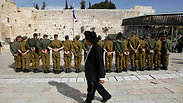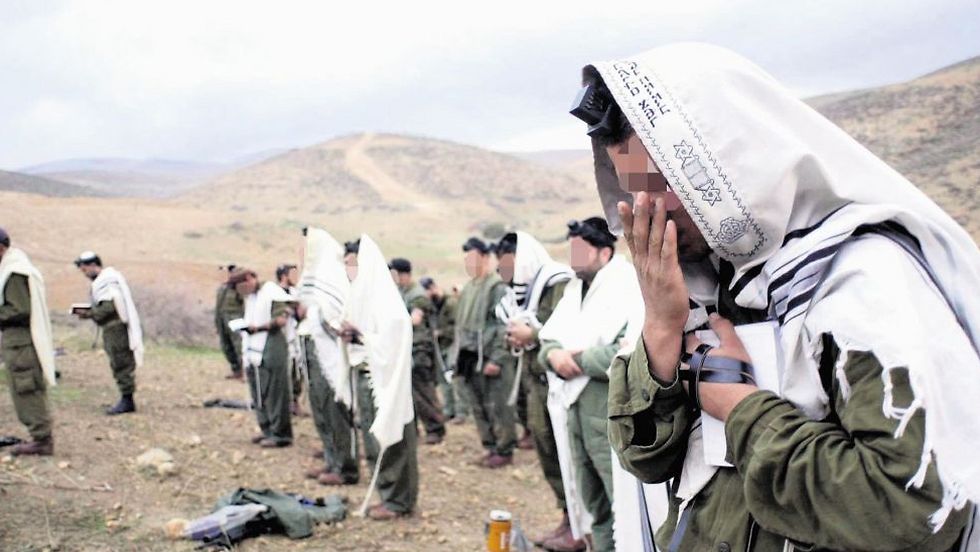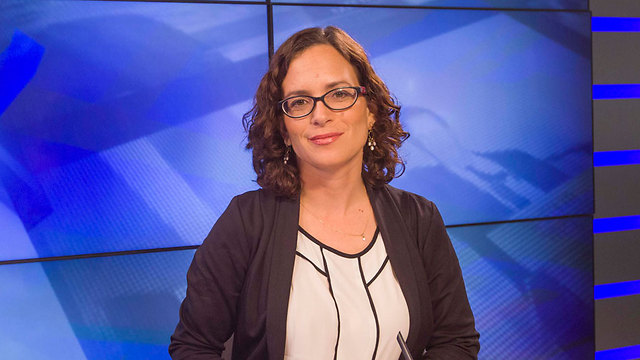
Rabbis inciting against women, non-Jewish soldiers at IDF course
Cadets who have participated in recent years in courses training military rabbis reveal an extremely problematic atmosphere contradicting IDF values. The course’s lecturers, they say, consistently preach against the enlistment of women and non-Jews—Druze, Bedouins and immigrants from former Soviet countries, as well as against the army’s rules of engagement.
“In practice,” says a person who participated in the course, “the real danger to the IDF is these rabbis, who even in everyday life put the Halacha (Jewish law) as they see it, radically, before the army’s policies.”
Cadets who have participated in courses training military rabbis in recent years reveal a very problematic atmosphere, which is not in line with the IDF spirit. The course’s lecturers, they say, consistently preach against the enlistment of women and speak out against the enlistment of non-Jews—Druze, Bedouins and non-Jewish immigrants from former Soviet countries.

In addition, the lecturers also convey messages that seriously contradict the rules of engagement. They state, for example, that the Halacha permits harming civilians and even innocent children during fighting. The rabbis reportedly make these comments in other military frameworks as well, in different lectures they give to soldiers and officers.
“These are radical rabbis who, on the one hand, receive a salary from the IDF, while on the other hand harm the IDF and incite the soldiers against the military spirit,” says a graduate of the rabbis’ course. “They don’t want women in the IDF, they don’t want gentiles, they hate Reform Jews and they do not hide the fact that they are deep in the ideological right. It doesn’t surprise me, because those are their opinions, but the question is how are they permitted to do so in an IDF framework.”
Female soldiers are off limits
The military course’s rabbi, Tzvi Kostiner, serves as head of the Mitzpe Ramon Yeshiva. He is considered a national Orthodox and a Zionist rabbi, but he is also one of the students of the rabbi leading the battle against the IDF’s “liberalism,” Zvi Israel Tau, president of the Har Hamor Yeshiva. In a lesson he delivered to his students last month, Rabbi Tau harshly criticized IDF Chief of Staff Lieutenant-General Gadi Eizenkot and the head of the IDF’s Personnel Directorate, Major-General Hagai Topolansky (who resigned in the meantime), over the examination of integrating women as fighters in the Armored Corps, referring to them as a “military junta.”
“Who ever dreamed of a girl inside a tank?” Rabbi Tau cried out. “Today there are pillboxes, guard posts, in different junctions in Judea and Samaria. They are manned by four soldiers, and some have two boys and two girls. They are locked in there for a long time. We cannot let this pass, we must not keep quiet. People are failing and sinning on a daily basis. There are two beds on the top and two beds at the bottom. It will reach cohabitation. They will have to build maternity hospitals there. Even today, there are abortions at the IDF’s expenses. Every female soldier can get two abortions a year at the IDF’s expense. It will continue and there will be big amounts. You will do reserve service and will be told to enter a tank with a woman. We are loyal to the IDF, we are prepared to fight and sacrifice ourselves, but when it comes to this issue it is unthinkable that someone would do anything against the Torah.”
This stance, according to cadets who participated in the course, is voiced by Rabbi Kostiner himself. “He usually says the problematic stuff during lessons in the early hours of the morning,” says a retired military rabbi who graduated from the course. “To his credit it must be said that he wakes up at 4 am, delivers a lesson and speaks a bit about everyday issues. He told us more than once that women’s service was a serious problem for the IDF.
“You must understand that these are his opinions. He can’t hide them. In his eyes, from a pure halachic point of view, women are simply not supposed to serve in the IDF. Definitely not religious women, and definitely not with men, in combat roles. I believe he should be appreciated for not giving up, like others in the military system, who change their views for jobs. On the other hand, it’s possible that this is less appropriate for the IDF.”
The result, according to another course graduate, is a negative attitude towards women. “In general, they tried to avoid having girls lecture us,” he says. “The few who arrived were interrupted and treated badly. It may have to do with their specific role in the IDF, but I believe it has to do with the source the future military rabbis get their world view from.”
‘No mercy for women and children at times of war’
The cadets in the courses, the last of which ended a few months ago, further claim that their lecturers did not hide their world view on the rules of engagement at routine times or at a time of war.
“They made sure to clarify that the rules of engagement are in no way connected to what is happening on the ground,” says a retired military rabbi. “Their practical interpretation of the Halacha goes against IDF procedures. The message they convey is that even women and children should be spared at a time of war. The problem is that they see us, the military rabbis, as messengers who should convey these messages to the soldiers as well. In other words, in the event of an operation in Gaza, for example, we have to face soldiers and give them motivation speeches which contradict IDF values. According to my personal interpretation, because it happened after I completed the court, they believe that we should encourage the soldiers to be Elor Azaria (a soldier convicted of manslaughter for shooting a neutralized terrorist in Hebron).”
Messages like these, say students of the course’s rabbis, are conveyed not only during the military course but also outside the course: In regular lectures to officers, in conversations with soldiers and in responses to students’ questions.
“These are not empty words,” says a former cadet who took the course. “There are clear halachic arguments. We are talking about famous rabbis, a spiritual and well-known authority in the depths of the Halacha. They don’t just use terms like ‘under no circumstances.’ As far as they are concerned, this is the Halacha and it cannot be played with.”
In one case, the graduate continues, a famous lecturer in those courses criticized the IDF and its commanders. “He explained to us that in the context of stopping terrorists, the rules of engagement are irrelevant to what happens during an incident. In his opinion, one cannot sit in an office and decide how the soldiers on the ground should act when they feel threatened. I’m not sure it’s a halachic stand, more like an ideological-security perception.”
The atmosphere in the course, the cadets say, is very anti-leftist, including comments against the New Israel Fund and against leftists who are “destroying the country.”
“One cannot expect anything else,” says a retired military rabbi. “That’s what they generally think. I have personally heard many such comments at the course from cadets too, because that’s the education they receive at home. It has nothing to do with the IDF. It’s just the way they are.”
Since Chief of Staff Eizenkot took office, the IDF has been trying to deal with the phenomenon of religious radicalization in the army. The national-Orthodox rabbis are furious. According to Rabbi Tau, the recent steps that have been taken are part of a foreign-funded trend aimed at weakening the army and “uprooting the sanctity” from the soldiers’ hearts. “It started with the LGBT people and we kept quiet, so they are carrying on,” he said.
In this context, commanders and cadets who participated in the court have reportedly expressed public support for the famous lecture given by Rabbi Yigal Levinstein from the religious army preparatory academy in Eli last summer, in which he branded homosexuals and lesbians as “perverts.”
Letters of support for Katsav
In recent years, the national religious public has undergone a process of splitting into different streams. Despite being a minority, specially politically, the nationalist Haredim have a lot of public influence. Their rabbis’ relations with the IDF are complicated, and one of the reasons for that is that the split between them and the national religious Jews was the result of a battle over modesty and segregation in the Bnei Akiva movement.
One the one hand, the Har Hamor Yeshiva in Jerusalem, one of the most prestigious Torah institutions in Religious Zionism and the place rabbis receive their nationalist Haredi ideology from, is known for its purist, fanatic and isolationist approach on religious issues, and its people are particularly sensitive to any deviation from the ideological or halachic line they have adopted.
On the other hand, another dominant component in the yeshiva’s world view is a messianic national perception which sanctifies the State of Israel as the Jewish kingdom announcing the arrival of salvation. As a result, the Nationalist Haredim have a lot of respect for the state’s leaders as people in positions with a supreme religious meaning, and once they are elected they have complete faith in them and give them almost unlimited credit. One of the most famous expressions of this approach was the letter of support sent by senior rabbis to former President Moshe Katsav after he was convicted of rape.
Being clear “national,” the Har Hamor Yeshiva strictly objects to causing any harm to the state’s institutions, led by the IDF. At times of crisis with the army, even extremely serious crises, they will avoid refusing orders, and will at most try—with consent—to evade participation in controversial missions that go against their conscience. That is what they did in the most extreme case of the past few years—the disengagement from Gaza.
At the same time, they seek to integrate into the army’s top echelon and the public service and influence society and the state “from the inside.” Accordingly, most religious military preparatory academies that have been established in the past 30 years originate in the same house of study and are usually loyal to its path.
The holy balance in the relationship between Har Hamor and the IDF, fanatic religiosity alongside messianic nationality, was violated only recently: Curbing “religionization,” restraining the Military Rabbinate, incorporating women in combat roles, exposing officers and soldiers to liberal Jewish values and the “joint service” order have all created significant cracks in the rabbis’ trust in the military authorities, and harsh public attacks were soon to follow. Rabbi Shlomo Aviner, one of the camp’s most prominent figures, even stated that the new order would be obeyed “under no circumstances.” While he did not actually rule that a soldier must violate the army’s orders in regards to this issue even at the cost of death, he did place it at the top level of the most serious offenses in the Torah—idolatry, bloodshed and incest.
‘Explosive stuff’
And there is one more thing that some of the nationalist Haredi rabbis, including Rabbi Kostiner, are preoccupied with: The military service of “gentiles”—Druze, Bedouins and immigrants from former Soviet countries who are not Jewish under the Halacha.
“It’s explosive stuff,” says a source involved in the matter. “There is some kind of perception, which is increasingly receiving a place of honor, while only on the margins, that there is no room for ‘non-Jewish soldiers’ in the IDF.”
During the course, cadets say, they often heard comments against the service of “non-Jews” and were told that the halachic stand is that such soldiers must not be promoted to an officer’s class, and moreover, that non-Jewish soldiers should be encouraged to drop out of the IDF.
Rabbi Kostiner, for example, reportedly opposes the military service of non-Jews for fear of assimilation and because he is concerned that religious soldiers will be tempted to use them to desecrate the Sabbath. “In his view, these soldiers hit on female Jewish soldiers, and he finds that intolerable of course,” says a retired military rabbis. “He refers to the Druze, but he also spoke about Russians. As for Shabbat desecration, there is the concept of a ‘Shabbat goy’ (a non-Jew who performs tasks on Shabbat that Jews are forbidden to do), and he is afraid that they will use them for unnecessary things too, like switching on the air conditioner, for example.”
As for members of the Druze sector, which still has high enlistment rates, another former course participant says that “it’s part of their radical approach. These are not people you can convince with the sacrifice and blood of the Druze. According to their perception, the Druze are not doing it for us, but because they have an interest, and the moment they can they will turn over and direct their weapon at us.”
The course trains rabbis for IDF units and is designed for reserve soldiers interested in serving as military rabbis, while training soldiers as rabbis in compulsory service. Its main purpose is to train rabbis for the IDF’s reserve units, and some of the course’s graduates go on to career service. The course is held regularly in the summer months at the Bahad 1 military training base and is divided between a regular officers’ course and a part run by the Military Rabbinate.

Knesset Member Rachel Azaria (Kulanu), a member of the Knesset’s Foreign Affairs and Defense Committee, recently encountered stories about nationalist Haredi rabbis’ war on the “IDF’s liberalism.”
“The IDF is the people’s army,” she says. “It’s our source of strength, it’s the way we manage to defend ourselves. Our nation is comprised of different, diverse populations: Religious, secular, ultra-Orthodox, traditional, including women. The nationalist Haredim have decided to mark the army as a takeover target and are trying to impose their world view on the entire army. We are being exposed to an attempt to turn the Military Rabbinate into their executive arm.”
At the Foreign Affairs and Defense Committee, IDF representatives reiterate that women are an essential part of the military system, Azaria says. “Moreover, the rate of women in combat roles is doubled every year, so the content we are exposed to here completely contradict the army’s orders and plans. The graduates of the military rabbis’ course move on to all units of the army and aim to influence and instill their values in the units and in the soldiers. Therefore, the content presented there must match the army’s values.
“Whoever undermines the chief of staff’s authority regarding the enlistment of women might also undermine his authority on other issued like rules of engagement. The Israeli society has groups that think they can take over, dictate and impose their specific ways on everyone. The IDF has always known how to stay out of disputes that dissolve the society despite the great complexity and maintain the army’s unity. This phenomenon, therefore, is intolerable.”
1st Lt. Omer Nahmany, who leads a project aimed at doubling the number of women and gay soldiers in combat roles, adds: “It must be clear that whoever hates IDF soldiers cannot be a commander and definitely not a military rabbi. The IDF serves as the Israeli society’s meeting points, a fact which for some reason is unclear to certain lecturers at the military rabbis’ course, who incite against IDF soldiers in the army’s own courses. Their students are in many cases a captive audience in the hands of dangerous people, and we expect the chief of staff, who has already stood up to radical elements, to urgently intervene.”
The IDF Spokesperson’s Unit offered the following response: “Rabbi Kostiner has been involved in the military rabbis’ course for many years and we are unaware of any appeals regarding his comment. The things that were allegedly said by Rabbi Kostiner do not match the spirit of the Military Rabbinate or the rabbis serving there, as well as the spirit of reserve rabbis and the rabbis involved in the military rabbis’ course. Any complaint about a comment which does not match the spirit of nationality and unity in the IDF will be looked into and handled accordingly. Chief Military Rabbi Brigadier-General Eyal Karim (who took office after the end of the latest course) has therefore ordered an investigation into the case revealed in the report.”










